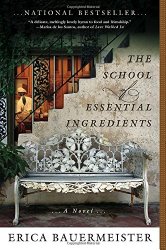 Okay, maybe it’s me. Maybe I’ve just grown to cynical. Why does everything seem so cliche?
Okay, maybe it’s me. Maybe I’ve just grown to cynical. Why does everything seem so cliche?
Okay, forget that. I didn’t hate The School of Essential Ingredients but I didn’t like it either. I’m really ambivalent. A friend warned me last year (when I was supposed to read it for book club that the similes would drive me crazy, “fingers stroking brass pots or picking up a glowing red pepper, like small children drawn to low-hanging ornaments on a Christmas tree.” She was right about the quantity of these, it’s as if the author made a list of similes to use, and proud of her achievement decided to incorporate as many of them as possible into her story. Eventually they stopped distracting me.
What did distract me or bothered me more was the telling of the story from nine different view points, a chapter for each person involved in the cooking class. I have the same issue with A Game of Thrones (and it’s one of the reasons I put it aside), just as I’m starting to relate, understand and maybe even like a character, I’m torn from that world and pushed into another.
Spoiler Alert
Then there are the cliches. The grieving widower whose wife of course died from breast cancer (saw that from the beginning), the wise-beyond-her-years teacher whose relationship with food and cooking is almost magical (reminded me of trying to be like “Like Water for Chocolate” in that regard and failing, the happily married couple, who of course, had troubles during there life and well it goes on. Not to mention poor Ian, who seemed an after-thought, thrown in so Antonia could have a nice happy ending.
Like I said though, maybe I’m overly cynical. It’s an easy read and won’t take much time, so check it out for yourself.
